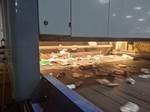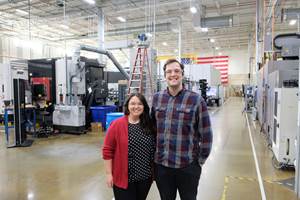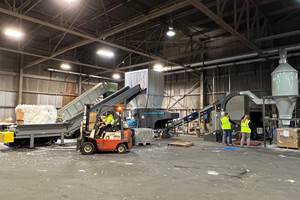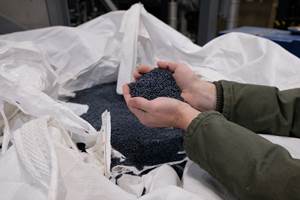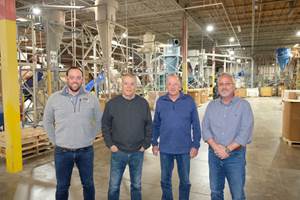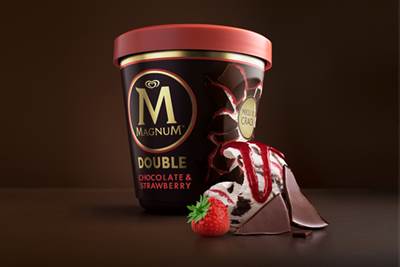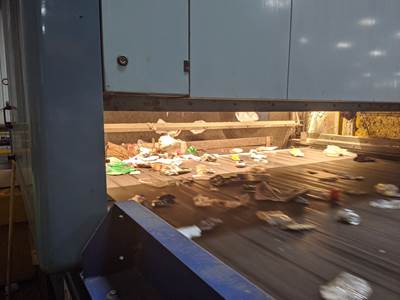Thoughts About Venice – and Recycling
The gleaming city on the Adriatic is held up by uncountable numbers of wooden pilings. Is that a viable model for the future of plastics recycling?
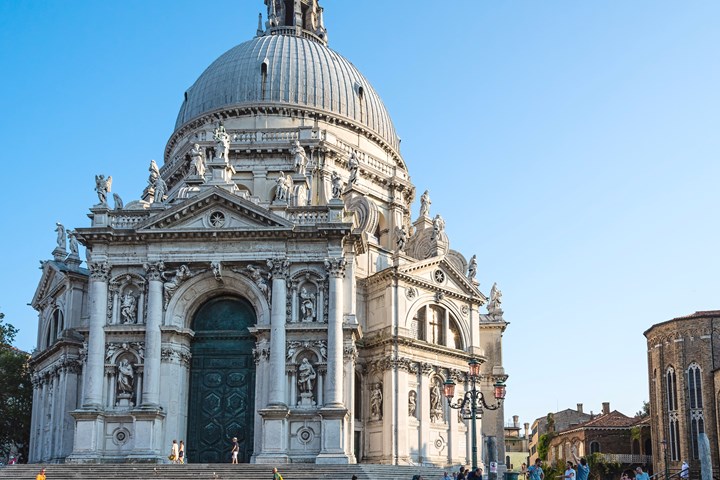
The 17th century church of Santa Maria della Salute in Venice is built atop more than a million wooden pilings driven into the mud beneath. Can a nationwide plastics recycling infrastructure stand on a myriad of individual programs, or does it need a more comprehensive model? (Photo: Matt Naitove)
Two things I’ve been thinking about a lot lately are Venice, Italy, and recycling. Venice is one of my favorite places on earth (though much of it is often underwater). My wife and I had to cancel our planned trip there two years ago because of the Covid pandemic, and now I’m getting itchy to revive our plans.
Venice is a miracle of adaptation to unpromising natural conditions. Its hundreds of soaring stone palaces and churches are built on soft alluvial mud. A millennium and a half ago, the inhabitants of a myriad of soggy little islands learned to drive wooden poles down through the mud until they struck hard-packed sand a few feet beneath. These tightly packed poles forced the water out of the mud between them, making the soil harder and more capable of load bearing. Then they laid foundation stones horizontally over the myriad wooden poles and bravely built their stone and brick city above them. One single church, built in the 17th century, rests on a cool million of those poles.
Now, about recycling. I’ve been thinking about that quite a lot lately, too. The subject is inescapable in communications about plastics. The whole industry seems to be buzzing about sustainability and the “circular economy,” all the more so in the run-up to the environmentally themed K 2022 show in Germany next week. Here are some samples of what has been stuffing my email inbox in recent weeks:
• Trex in Winchester, Va., a well-known maker of plastic lumber based on recycled PE, launched NexTrex Grassroots Movement, “a turnkey framework for municipalities, universities, nonprofits and other qualifying business to serve as centralized drop-off locations for recycling PE plastic film while earning funds for their organizations.” Trex is thereby enlarging its source network for recycled raw materials.
• Stanley Black & Decker has partnered with recycler TerraCycle, Trenton, N.J., to launch a free program for owners of Stanley Black & Decker power tools, hand tools and accessories, as well as home appliances via prepaid shipping labels and shipping kits for equipment containing lithium batteries.
• Dart Container Corp., Mason, Mich., has partnered with TerraCycle to enable colleges, schools, community groups and individuals to recycle Dart’s Solo Cup brand plastic drink cups through a free recycling program that supplies prepaid shipping labels.
• Another TerraCycle free recycling program involves Karma Pet Foods, Victorville, Calif. Pet owners can obtain pepaid shipping labels to mail in their empty Karma dry pet-food packaging in return for “TerraCycle points” that can be converted into cash donations for schools and nonprofits.
• What about recycling nutrition bar wrappers? TerraCycle (they’ve been busy!) has a program with GoMacro, a mother-daughter maker of organic, vegan MacroBars in Viola, Wis. Again, prepaid shipping labels are available for fans of these protein and nutrition bars to mail in wrappers that are not recyclable locally.
• And drink containers, too: BuzzBallz, LLC/Southern Champion, a producer of premixed cocktails and small-batch distilled spirits in Carrollton, Tex., is working with TerraCycle to assist consumers and bartenders in recycling rigid plastic and aluminum packaging for BuzzBallz drinks. It’s another mail-in program using prepaid shipping labels.
• Boxed, Inc. of N.Y.C., an e-commerce retailer and “enabler,” is working with TerraCycle (!) to help customers recycle any brand of home essentials and personal-care products. Consumers can mail in their waste using prepaid shipping labels.
Each of these are rather specific, small-scale programs (except maybe Stanley Black & Decker). I was amazed (and baffled) to encounter recycling programs tailored to a specific brand of nutrition bar, premixed cocktail, drink cup or pet food. Is this kind of highly piecemeal approach the answer to the much-needed expansion of availability of recycled plastics?
It also gives me pause to consider that each of these programs requires consumers and businesses to collect and ship out their own waste plastic products, even with prepaid labels. If this model catches on, imagine collecting half a dozen products in your home to obtain special shipping labels and then either box them up yourself or find a retail shipping office (FedEx, UPS, etc.) to handle it. Who welcomes that?
But back to Venice. If one of the most beautiful, historic and fascinating cities in the world can be built atop innumerable pine posts a few inches wide, can a recycling industry be built on individual brand owners arranging mail-back programs with consumers and commercial customers? Or is that just the first step toward evolving some sort of comprehensive recycling solution?
Which leads me to consider the parallel evolution today of mechanical and “advanced” chemical recycling infrastructures. The former involves regrinding, washing, sorting and remelting waste plastics. The second, which involves breaking down plastics into their constituent chemicals, may involve the first three steps—regrinding, washing, sorting—but is less sensitive to the thoroughness of the latter two steps. In fact, chemical recycling is potentially the solution to dealing with mixed plastics, multilayer composites of different materials, “hard-to-recycle” plastics like PVC, and engineering plastics that are produced in much smaller volumes than commodities like PE, PP and PET.
But whereas mechanical recycling is compatible with widely dispersed operations located close to the producers and/or users of plastics waste, chemical recycling does not appear to be something you would readily set up just anywhere, not to mention in a building beside your processing plant. Environmental restrictions would probably be even more onerous than for mechanical recycling.
The technology and know-how to engineer, build and operate what is, in effect, a chemical plant is not something most waste handlers or plastics processors have at their disposal. So, logically, I’d have to conclude that chemical recycling will “belong” to chemical companies—most likely the same ones that make virgin plastics. After all, they’d be the likely customers for the output of chemical recycling plants.
And because chemical companies like to produce on large scales—millions of pounds—I could imagine a two-tier future for recycling infrastructure. On the one hand, there will probably be many small to medium-size mechanical recyclers that supply regional markets or a single parent corporation that also produces finished plastics products—bottles, lumber, etc. That’s the Venice part. On the other hand could be a smaller number of large-scale chemical recycling operations linked to virgin plastics producers that handle vast amounts of municipal and industrial waste. That could be the more comprehensive solution to plastics recycling, existing side by side with the Venetian model (minus the singing gondoliers).
Related Content
Scaling Up Sustainable Solutions for Fiber Reinforced Composite Materials
Oak Ridge National Laboratory's Sustainable Manufacturing Technologies Group helps industrial partners tackle the sustainability challenges presented by fiber-reinforced composite materials.
Read MorePurpose-Built System Enhances Capacity and Flexibility for Recycler
A Boston recycler invested in a turnkey shredding, granulation and elutriation system to expand its plastics reclaim business.
Read MoreNew Facility Refreshes Post-Consumer PP by Washing Out Additives, Contaminants
PureCycle prepares to scale up its novel solvent recycling approach as new facility nears completion.
Read MoreEvolving Opportunities for Ambitious Plastics Recycler
St. Joseph Plastics grew from a simple grinding operation and now pursues growing markets in recycled PP, food-grade recycled materials, and customized post-industrial and post-consumer compounds.
Read MoreRead Next
Chemical Recycling Poised to Take Off
Investments in chemical-recycling facilities abound as the industry moves closer to the Circular Economy model, accompanied by plenty of new rollouts of packaging made from chemical recycling.
Read MoreChemical and Mechanical Recycling Can Coexist. Will They?
Emerging technologies present advantages and challenges
Read MoreLead the Conversation, Change the Conversation
Coverage of single-use plastics can be both misleading and demoralizing. Here are 10 tips for changing the perception of the plastics industry at your company and in your community.
Read More


